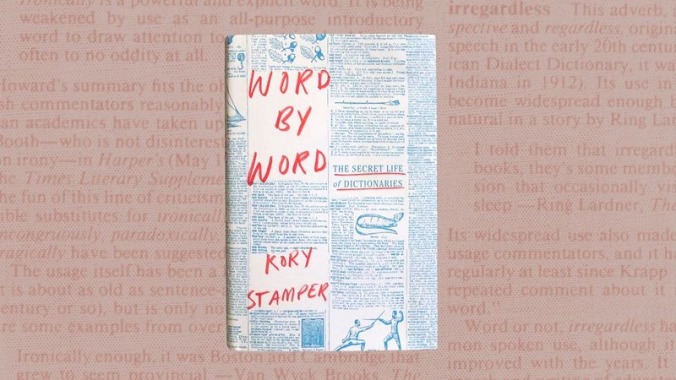Word By Word makes the surprisingly convincing case for “irregardless”

“The dictionary” is one of those background items that’s always just there, little thought about and quickly forgotten after looking up a word. Those of us who deal with the English language for a living might appreciate a particularly illuminating definition, but the focus is always on the word itself, not on the person who took the time to define it. But behind every dictionary definition is a lexicographer, and it’s their curious, somewhat strange world that’s lovingly uncovered in Kory Stamper’s Word By Word. Stamper is a lexicographer at Merriam-Webster, America’s oldest dictionary. The book’s subtitle—“the secret life of dictionaries”—aptly sums up what you’re getting yourself into when you crack open the book, and while that may sound dry, this world is a compelling, peculiar one, well worth getting lost in for a while.
And thanks to Stamper’s assured prose, Word By Word is educational but also entertaining and surprisingly funny, never more so than when she describes the office culture at Merriam-Webster. “The sepulchrally quiet” floor where the lexicographers work is kept in hushed silence, as speaking out loud poses too great a threat to the concentration needed to define words. This is where the lexicographers “spend the better parts of their lives writing and editing dictionary definitions, thinking deeply about adverbs, and slowly, inexorably going blind.” No phones crowd the lexicographers’ desks, where piles of papers bearing word usage are measured in inches and their rearrangement by a cleaning crew can send a lexicographer into (silent) hysterics. When Stamper concludes her long work on the definition take, she celebrates: “I was so pleased with myself that I pushed back from my desk, looked left and right to make sure that no one was within glancing range, and then emphatically punched the air and mouthed ‘YES.’”
But it’s the drama of defining words and the passionate case Stamper makes for dictionaries and the messy, chaotic English language that gives the book its weight. English constantly evolves, but you wouldn’t know it from the way some pedants insist on following arbitrary grammatical rules or enforcing their own pet peeves as “proper” English, which often comes from a place of racism or classism. We’re also—very recently—in a political climate where the very definitions of words are politicized, as Trump’s administration bastardizes language to shroud and confuse. Even without this fraught 2017 context, though, Word By Word presents a worthy defense of English’s true nature, which is messy and weird and surprising and not at all the orderly thing English teachers make it out to be. No where is this lesson better made than in the chapter on irregardless. Early on in Word By Word, where Stamper lays out the basics, she helpfully explains descriptivism and prescriptivism, the battling philosophies of the English language:
The whole notion that the dictionary merely records the language as people use it grates against what we generally think dictionaries do. Many people—and many people who think they’d be good at this lexicography gig—believe that the dictionary is some great guardian of the English language, that its job is to set boundaries of decorum around this profligate language like a great linguistic housemother setting curfew. The language is protected, kept right, pure, good. This is called “prescriptivism,” and it is unfortunately not how dictionaries work at all.








































